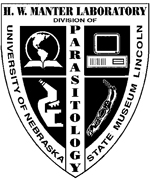Parasitology, Harold W. Manter Laboratory of

Harold W. Manter Laboratory of Parasitology: Library Materials
Document Type
Article
Date of this Version
2016
Citation
Parasitology Research (2016) 115: 3,637-3,642
doi: 10.1007/s00436-016-5149-4
Abstract
Echinococcus multilocularis is a tapeworm that may cause alveolar echinococcosis (AE), one of the most dangerous parasitic zoonoses. As in the case of other foodborne diseases, unwashed fruits and vegetables, contaminated with dispersed forms of E. multilocularis, may serve as an important transmission route for this parasite. In this article, we reply to the incorrect interpretation of results of our study concerning the detection of E. multilocularis DNA in fresh fruit, vegetable and mushroom samples collected from the highly endemic areas of the Warmia-Masuria Province, Poland, to dispel any doubts. The accusations formulated by the commentators concerning our paper are unfounded; moreover, these commentators demand information which was beyond the purview of our study. Making generalisations and drawing far-reaching conclusions from our work is also unjustified. The majority of positive samples were found in only a few hyperendemic communities; this information corresponds with the highest number of both infected foxes and AE cases in humans recorded in this area. Our findings indicate that E. multilocularis is present in the environment and may create a potential risk for the inhabitants. These people should simply be informed to wash fruits and vegetables before eating. No additional far-reaching conclusions should be drawn from our data. We believe these commentators needlessly misinterpreted our results and disseminated misleading information. Nevertheless, we would like to encourage any readers simply to contact us if any aspects of our study are unclear.


Comments
Open access material
License: Creative Commons Attribution 4.0 International (CC BY 4.0 International)